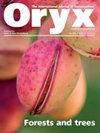对新加坡国内象牙贸易禁令前后的网上象牙贸易进行系统调查
IF 2.1
3区 环境科学与生态学
Q2 BIODIVERSITY CONSERVATION
引用次数: 0
摘要
在过去的20年里,野生动物的非法在线贸易显著增加。我们采用系统的调查方法,考察了新加坡实施国内贸易禁令前后的象牙网上贸易,以了解出售象牙的形式、使用的电子商务网站以及国内贸易禁令的效果。用象牙和象牙的外形、形状和颜色来代替象牙,我们发现大多数网上的商品都是鸟笼和相关的配件,比如喂鸟的杯子和用来装饰它们的装饰品。在2021年9月1日实施国内象牙贸易禁令后,观察到象牙上市总数下降了76%。因果影响分析表明,国内贸易禁令具有很强的因果效应,与基于贝叶斯结构时间序列模型在没有禁令的情况下预测的反事实市场反应相比,每周发现的新上市股票平均数量下降了83%。电子商务网站在打击网上非法野生动物贸易方面发挥着重要作用,它们删除了被标记的商品,并发出通知,提高人们对禁令的认识。我们发现,与检测图像中的施雷格线相比,产品的文字描述对于初步区分合法和潜在非法上市更有效,尽管这仍然是执法部门面临的重大挑战。我们的发现可以为未来开发在线市场上象牙的自动检测方法提供信息。本文章由计算机程序翻译,如有差异,请以英文原文为准。
A systematic survey of the online trade in elephant ivory in Singapore before and after a domestic trade ban
Abstract The illegal online trade in wildlife has increased significantly over the last 2 decades. Applying a systematic survey approach, we examined the online trade in elephant ivory before and after the implementation of a domestic trade ban in Singapore, to understand the forms of elephant ivory offered for sale, the e-commerce sites used and the effect of the domestic trade ban. Using elephant ivory and lookalikes in form, shape and colour as proxies for elephant ivory, we found that most of the online listings consisted of bird cages and related accessories such as bird feeding cups and ornaments used to adorn them. After the domestic trade ban in elephant ivory was implemented on 1 September 2021, a 76% drop in total listings was observed. Causal impact analysis indicated a strong causal effect of the domestic trade ban, resulting in an 83% drop in the mean number of new listings found weekly relative to the predicted counterfactual market response based on a Bayesian structural time-series model in the absence of the ban. E-commerce sites play an important role in combatting illegal wildlife trade online by removing flagged listings and sending notifications to raise awareness of the ban. We found textual descriptions of products to be more effective for preliminary differentiation of legal and potentially illegal listings compared to the detection of Schreger lines in images, although this remains a significant challenge for law enforcement. Our findings can inform future efforts to develop automated detection methods for elephant ivory in online markets.
求助全文
通过发布文献求助,成功后即可免费获取论文全文。
去求助
来源期刊

Oryx
环境科学-生态学
CiteScore
5.30
自引率
7.40%
发文量
150
审稿时长
18-36 weeks
期刊介绍:
ORYX—THE INTERNATIONAL JOURNAL OF CONSERVATION, a quarterly journal from Fauna & Flora International, publishes research on biodiversity conservation, conservation policy and sustainable use, and the interactions of these matters with social, economic and political issues. The journal has a particular interest in material with the potential to improve conservation management and practice. Explore the map for details of published articles.
 求助内容:
求助内容: 应助结果提醒方式:
应助结果提醒方式:


